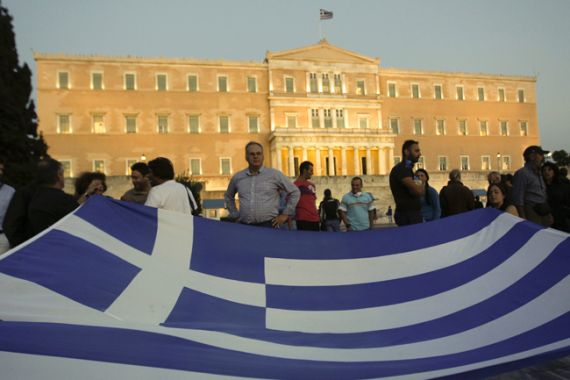Eurozone leaders agree to fund Greek bailout
EU finance ministers agree to release $7.7bn in pledged funds after Greece proved that it met all necessary conditions.

| Al Jazeera’s Laurence Lee reports from London as Britain’s finance minister reveals a gloomy outlook for the economy |
European finance ministers confirmed that their governments have agreed to release their share of an $10.7bn loan Greece needs to avoid default, an EU diplomat said.
“It’s done,” the diplomat said after ministers from the other 16 eurozone states accepted that all conditions imposed on Athens since the monies were first frozen back in August had now been met.
Keep reading
list of 4 itemsEcuador weighs security, international arbitration in latest referendum
‘Triple spending’: Zimbabweans bear cost of changing to new ZiG currency
Boeing hit with 32 whistleblower claims, as dead worker’s case reviewed
The eurozone states are committed to a $7.7bn payout, the remainder due from the International Monetary Fund (IMF).
Greece needs the funds by December 15 to pay its bills. The funds are the sixth installment from a $146bn IMF bailout offered to Athens in May 2010.
The eurozone has held up the funds since August as it waited for Greece to commit to economic reforms.
George Papandreou, the former Greek prime minister, angered partners earlier this month when he threatened to call a referendum on a new rescue package, causing a political crisis that led to his resignation.
A national unity government was then formed, led by Lucas Papademos, the former European Central Bank deputy chief.
The aid was released after the leaders of the three main political parties, including the once reluctant conservative chief Antonis Samaras, sent written pledges confirming their support of reforms as demanded by eurozone partners.
Evangelos Venizelos, Greece’s finance minister, said Athens had met “all the necessary conditions” to get the loan funds.
“We have the necessary political consensus, we have the necessary national unity and also the national commitment and determination to go ahead,” he told reporters.
“We are also ready to contribute in this very important discussion for the future of the eurozone, for a strong eurozone which is capable to react and send very clear messages to the markets.”
Gloomy outlook
George Osborne, British finance minister, revealed a gloomy outlook for the UK economy on Tuesday, saying in his autumn budget statement that growth in the coming year would be lower than expected.
He warned the eurozone crisis was the most pressing issue and needed to be resolved for the sake of Europe and the world.
Underlining the threat to European economies, the ratings agency Moody’s warned on Tuesday it could downgrade the subordinated debt of 87 banks across 15 countries on concerns that governments would be too cash-strapped to bail them out.
Standard & Poor’s, another ratings agency, also said it could downgrade the outlook on France’s top-level triple-A credit status within the next 10 days, hinting at a possible rating cut.
On Monday, the Organisation for Economic Co-operation and Development (OECD) said that the financial crisis that began in Europe now poses a real threat to the entire global economy.
The OECD issued the warning as it cut its global growth forecast for this year and next.